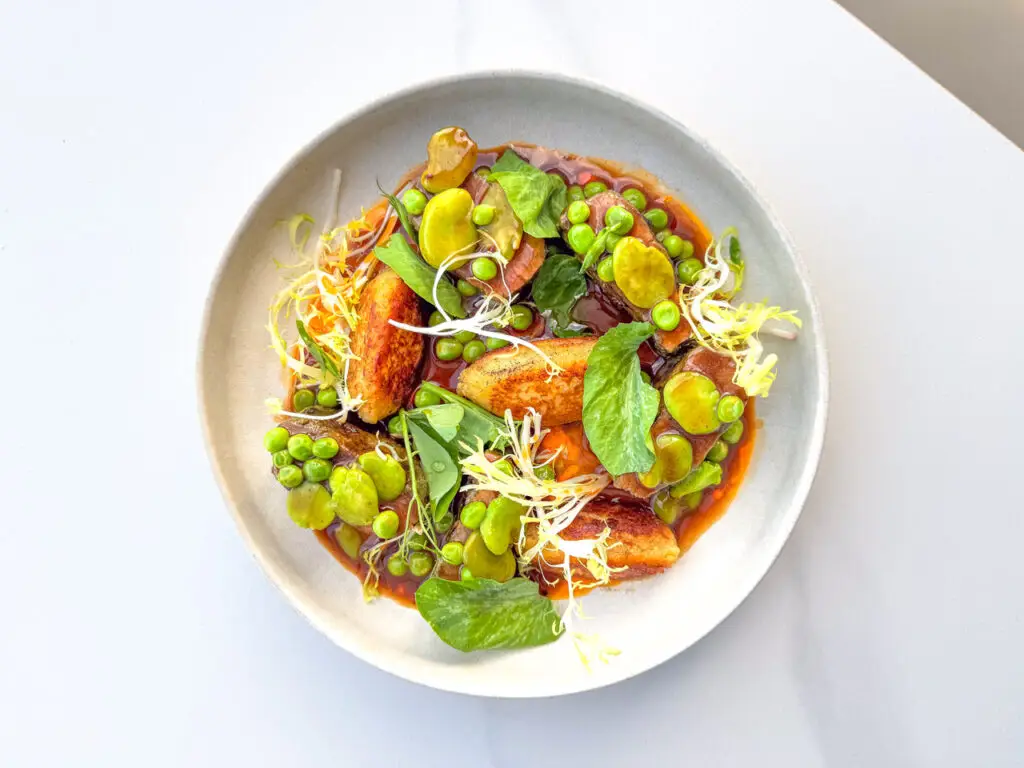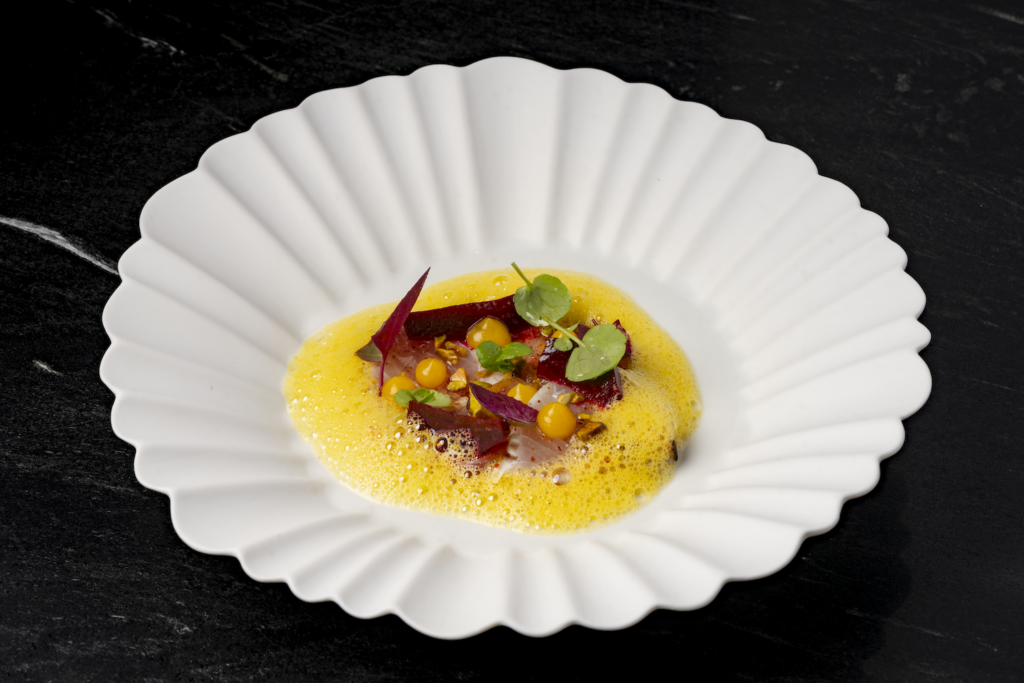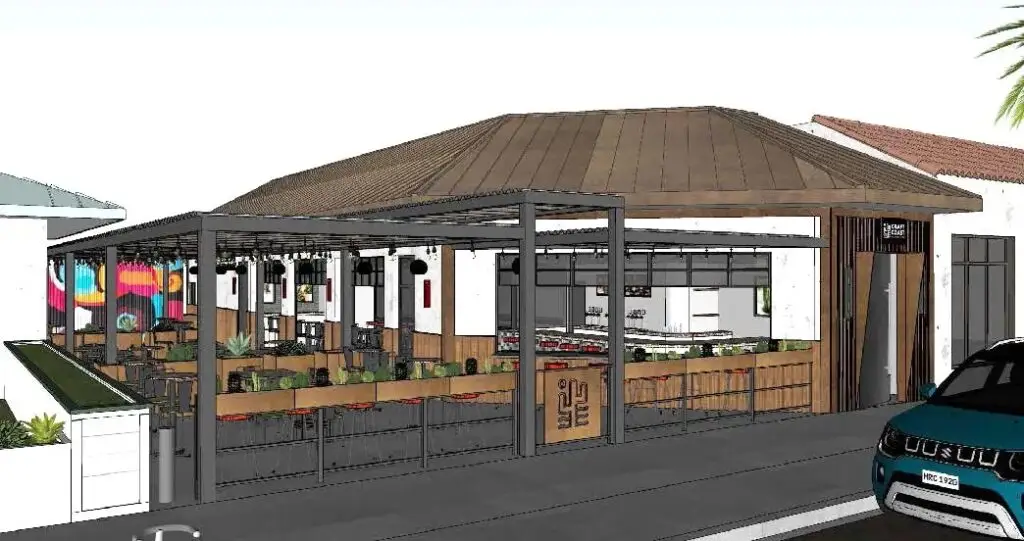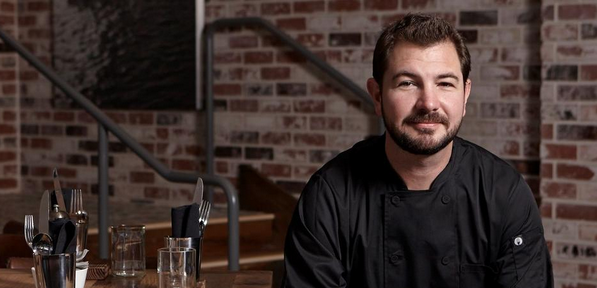For 10 years, chef Christian Graves of Jsix has quietly been one of San Diego’s brightest stars. A humble guy, quiet yet sarcastic. Not showy. I once went into his kitchen and watched him surgically break down a whole hog into various edible parts. He used his knife with the fluidity of an experienced dancer, with respect for the animal and intent on using every single bit. Graves was at Farallon in San Francisco before coming to San Diego.
“The plan was to stay two years—I’ve been here ten,” he says. Farallon is a pretty iconic seafood house, and at Jsix Graves cooked some of the best sea plates around. He was also, along with a few other chef friends, one of the original founders of Cooks Confab—once the most popular chef-collaboration event in San Diego. After considering opening up his own place here in San Diego, he’s decided to move his family to Colorado and see what the wind brings. In this “exit interview,” he explains why his idea couldn’t work in San Diego, why California is increasingly difficult for chef-owners, what he loved about cooking here, his thoughts on what San Diego needs, and the ever-growing problem of not enough cooks in America.
What will you miss most about San Diego?
It’s been awesome. Fantastic. I’ve literally enjoyed every second. Maybe not every second, but almost. I’ll miss the lifestyle, lobster diving, spear fishing, deep sea fishing, surfing. It’s just a great place to live. 72 and sunny is how I’m going to remember San Diego. I could hear the ocean at night from where we lived in Coronado. It’s just very grounding.
And Jsix?
It was awesome. My intention was only to be here two years, and I’ve been here for ten. A quarter of my life.
I’d heard you were looking to do your own restaurant in San Diego not too long ago.
We looked into it. It just wasn’t penciling out. The biggest challenge is the labor side. California is marking it hard. With the increase in minimum wage, you have tipped employees who are getting their minimum wage increased as well. There’s no tip credit [which takes tips into consideration when mandating how much employers must pay employees]. It’s a challenge. Now take that and combine it with fact that the workforce in culinary is very small. I’ve had more conversations with chefs that there’s just not enough cooks around.
I’ve heard the cook shortage is a problem all across the nation…
I’ve seen it across the board in other cities. But I feel like it’s more challenging in San Diego. You have a smaller workforce and x amount of restaurants. The other problem is that some of the bigger [restaurant groups] or people who don’t have to just run their single restaurant on a margin, are able to float cooks a little higher salary. I’ve interviewed people who are making $17 an hour as a line cook. Pastry assistants who are making $20 an hour. I can’t fault them. Those are golden handcuffs. Hell, I want to make little tarts for $20 an hour. They’re not learning a ton, but, still, they’re getting a check.
How much is it hurting the restaurant scene?
I have a friend who owns a pretty large restaurant group in San Diego and wants to open up more restaurants. But he’s apprehensive. He doesn’t think there’s enough people here right now. It will ultimately water down the food scene. At some point you’re going to have sous chefs who’ve been cooking for two or three years mentoring the line cooks. It is a national problem.
I’ve heard new cooks have some pretty unrealistic expectations, too…
At Jsix we tried to mentor people and find people with good hearts who wanted to be here. But it’s hard to find cooks who want to be there, and don’t think like, ‘I’m going to be on the Food Network and be an executive chef in a year.’ It’s just not that way. There’s a way in the kitchen and you have to take time and learn it. You have to understand food and the history of it.
What’s hard about being a restaurant chef in San Diego?
It’s hard to cook when it’s 72 and sunny everyday. A lot of cooking is inspired by weather. Hard to braise a dish when you just got out of a surf.
One of your favorite memories about cooking in San Diego?
The original Cooks Confab. I think what we appreciated about it was being part of a group, a union. That’s part of my DNA. Watching all of these chefs come together was awesome. Especially coming from San Francisco, where that wasn’t the case. Being part of that chef community down here is probably my happiest, purring moment.
So San Diego’s much more collaborative than San Francisco?
One-hundred percent. If I had to sum it up, it’s that everyone in San Diego wants to help drive the food scene and they participate well together for that purpose. I think in other places it’s a lot of ego and ‘My place is better than yours.’ I think here it’s like ‘How do you do that dish?’ And they tell you. I can’t tell how many conversations I’ve had with Jason Knibb [of Nine-Ten] about how he does a dish. And Jeff Jackson at Lodge at Torrey Pines. They’re transparent and open. That helps grow the scene.
So the “big stars” here are much more accessible?
Yes. If I want to go see a farmer, I can go see one. If I want to talk to a brew master, they’re extremely accessible. It’s not that kind of town where you have to ask for a meeting. I’m going to walk in in my flip flops and strike up a conversation.
What does San Diego’s restaurant scene need?
What I did appreciate about San Francisco is that they’re very proud of their food scene. People want to show their neighbor that they know the best place to go. They want to participate in the restaurant culture. It’s like a bread culture where you have to keep feeding it. You have to nurture restaurants and take care of them. I’d love to see San Diego get out and go out beyond Restaurant Week. Almost every restaurant offers restaurant week prices every day.
I’ve talked a lot about this. San Diegans don’t seem to eat out as much as people in other cities. Is it the weather? People expend so much of their energy outside?
It could have to do with the fact that there’s so many great things to do that it’s not a priority. If you’re in the water at six in the morning, are you really going to be out on the town at 10PM?
Where were your go-to restaurants in San Diego?
Probably go-to was Last Quatro Milpas for tacos. It’s between my house and work, so I could get in early before the line forms. All the chefs used to meet at Yakitori Yakyudori in Hillcrest, which closed [note: their Kearny Mesa location is still open]. I also miss Gaigin. Kind of our celebration spot is Nine-Ten. I love breakfast at A.R. Valentien. Sitting on the patio, I had one of the most memorable dishes in Jeff Jackson’s eggplant hole in the wall. He poked a hole in the eggplant, fried an egg in it with added prosciutto. I go to Leroy’s all the time because it’s down the street from where I live.
Who is the most underrated chef in San Diego?
I think Jason Knibb [at Nine-Ten] is my favorite chef down here. He’s tremendously underrated and if he were in any other city he would be on the Food Network. I don’t know if it’s the worst thing that he only does 40 covers a night. It kind of keeps him who he is.
Up-and-coming chefs to watch?
I’ve been standing in place long enough to see the second generation of chefs come up. Like Carlos Anthony who’s working with Brian Malarkey at Herb & Wood. Aldo Negrete (ex-Rare Form, now JRDN) and Lhasa Landry (Eco Caters, Blind Lady Ale House) are great chefs. TJ working next to Jeff Jackson at A.R. Valentien is really talented. It’s just neat to watch.
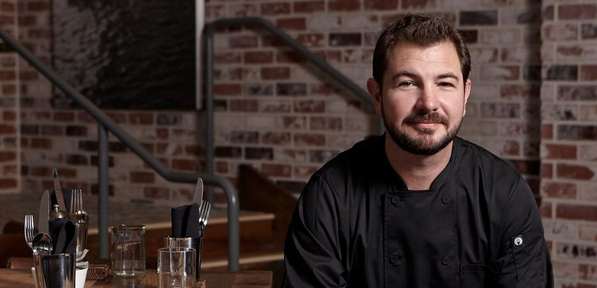
PARTNER CONTENT
Goodbye: Christian Graves

